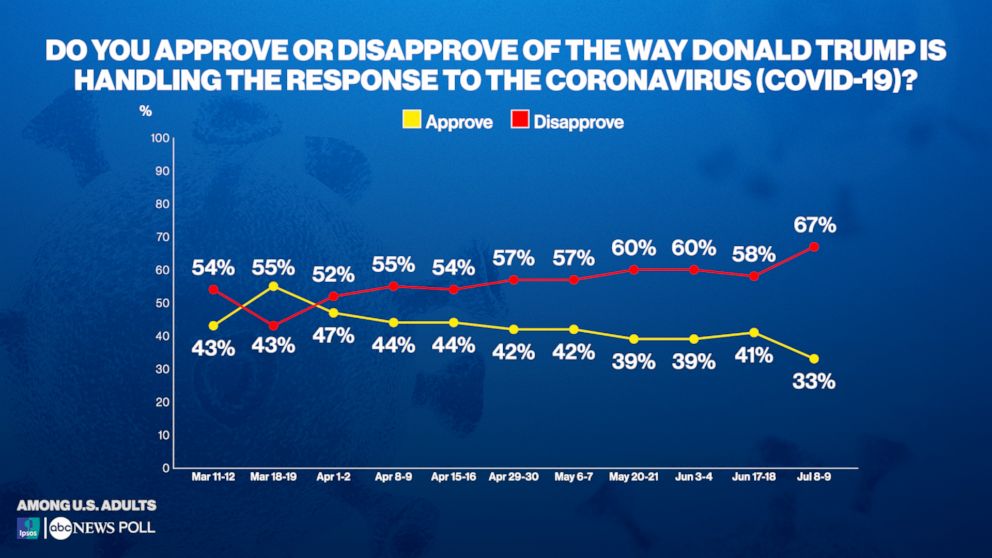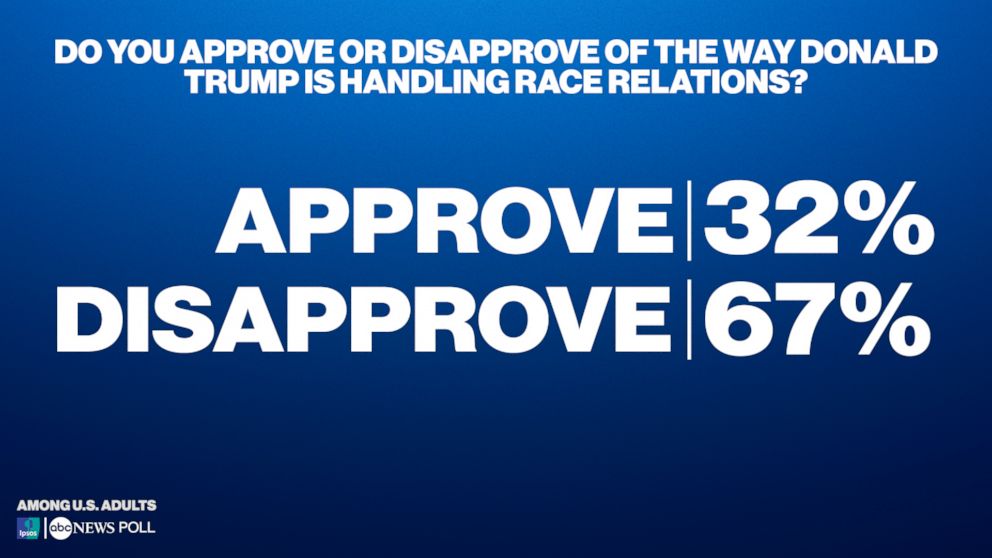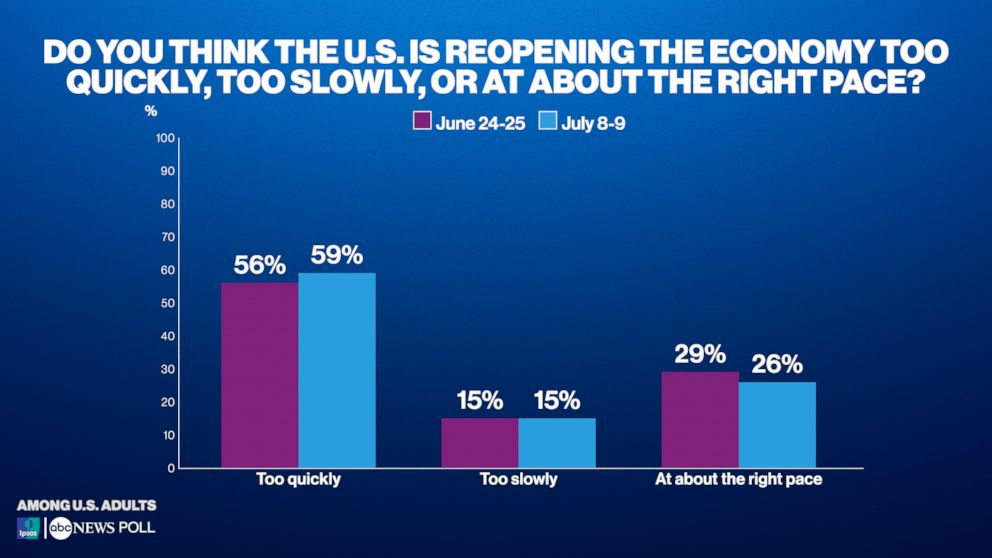Broad disapproval for Trump's handling of coronavirus, race relations: POLL
Evaluation of Trump's oversight of the COVID-19 crisis reached a new low.
President Donald Trump is facing broad disapproval for his management of the two major crises gripping the nation, with two-thirds of Americans giving him low marks for both his response to the coronavirus pandemic and his handling of race relations, according to a new ABC News/Ipsos poll released Friday.
Evaluation of Trump's oversight of the COVID-19 crisis reached a new low since ABC News/Ipsos began surveying on the coronavirus in March, with 67% disapproving of his efforts. One-third of the country approves of the president's oversight of the pandemic.

Over nearly four months of polling, Trump's approval has mostly held steady, except for one week in mid-March, when it spiked above 50%. In the last month, Trump's approval dipped to a range between the high 30s and low 40s, as the U.S. saw a resurgence of coronavirus cases, particularly across the south and west.
In the newest poll, which was conducted by Ipsos in partnership with ABC News using Ipsos’ Knowledge Panel, Trump's approval rating on his job dealing with the coronavirus dropped another rung, driven by plunging support among independents and even waning support among Republicans. Democrats have always been highly skeptical.
Trump's approval among independents lands at 26% in the survey, a sharp drop from 40% in mid-June, the last time the question was asked. Trump's disapproval among independents has risen to 73%, up from 59% in the June poll.
Within his own party, Republicans are less inclined to back him in the newest poll, with only 78% approving of the president's handling of the coronavirus, compared to 90% in mid-June. His disapproval of 22% in the new poll is a more than two-fold increase from last month.

In a variety of demographic groups, there are clear and consistent shifts in support away from the president.
Men (66%) and women (67%), in near equal measure, disapprove of the president's coronavirus response, which represents a double-digit increase among men since the June poll, when 54% disapproved.
Even white Americans without a college degree, considered to be a core constituency of Trump's base, are split in their approval of the president's handling, with 50% disapproving and 49% approving, compared to 42% disapproving and 57% approving in that last poll.
The newest numbers come as Trump continues to downplay the threat posed by the virus, even as confirmed cases climb.
Earlier this week, Trump falsely claimed that "99 percent of [coronavirus cases] are totally harmless," while casting the movement to remove statues of controversial figures in the country's history as the most pressing threat to the nation.
Trump's focus on what he called an "angry mob" looking to "tear down our statues" and "erase our history," comes as the country continues to reel from the killing of George Floyd, a Black man, who died on Memorial Day after he was pinned down by a white Minnesota police officer, and the nationwide unrest over racial injustice that followed.
The new poll comes amid debates over renaming and removing statues that bear the names of Confederate figures, and after Mississippi lawmakers voted to remove the Confederate battle emblem from the state flag.
Americans are more than eight times as likely to have a negative reaction to the Confederate flag than a positive one, the new poll finds, marking a shift from just five years ago.
In a 2015 poll from Pew Research Center, 13% said they had a positive reaction to the Confederate flag, compared to 28% who said they had a negative reaction. Now, only 5% say they have a positive reaction to the defining emblem of the Confederacy, while 43% have a negative one.
Still, a majority of Americans, both in 2015 and now, said they had neither a positive or negative reaction to the flag.
A negative reaction is even more pronounced for black Americans, who are more than two times as likely as white Americans to have a negative reaction to the Confederate flag, 76%-37%. Just over four in 10 Hispanics have a negative reaction to the banner.
The reckoning over race comes over three years into Trump's presidency, throughout which, he has invoked inflammatory rhetoric on the issue.
Trump is seeing his approval broadly underwater for his handling of race relations, even across all racial groups. More than half (57%) of white Americans, and overwhelming majorities of black Americans (92%) and Hispanics (83%) disapprove of the president’s handling of this issue.
Although his approval among Republicans falls at 78% on race relations, this is far less than the strong majority of Democrats (91%) who disapprove of the president on this issue. Independents (74% disapprove) are also deeply skeptical of the president’s handling of race relations.
The faltering numbers for Trump are also accompanied by concerns over the country's path to reopening.
A majority of Americans (59%) believe the push to reopen the economy is moving too quickly, similar to a June 26 ABC News/Ipsos poll when it was 56%.
Currently, 15% think the country is moving too slowly, and 26% think the country is moving at the right pace.

The more reticent attitudes about reopening the economy appear to challenge Trump's aggressive push to return the country to normal.
On Wednesday, the president threatened to "cut off funding" to schools that don't reopen in the fall and criticized the Centers for Disease Control and Prevention's guidance as "very tough," "expensive" and "impractical."
By Thursday morning, Dr. Robert Redfield, who heads the CDC, told ABC News chief anchor George Stephanopoulos on "Good Morning America" that the agency's guidance for protecting against the novel coronavirus remains the same but that they will be providing "additional reference documents" to aid communities wanting to reopen their K-12 schools this fall.
This ABC News/Ipsos poll was conducted by Ipsos Public Affairs‘ KnowledgePanel® July 8-9, 2020, in English and Spanish, among a random national sample of 711 adults, with oversamples of black and Hispanic respondents. Results have a margin of sampling error of 4.1 points, including the design effect. See the poll’s topline results and details on the methodology here.




